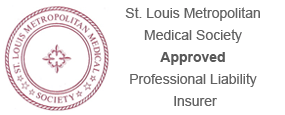The letter appears to be an innocuous business letter in a non-descript envelope. The text is usually passive in tone, asking you to respond to what is normally a one-page handwritten complaint by a disgruntled former patient. It would be easy to view it as a casual request to be dealt with in a casual manner, or worse yet, ignored. However, that letter from the Board of Healing Arts should be treated as a serious matter requiring a call to your insurance carrier as soon as it is received.
The Missouri Board of Registration for the Healing Arts is comprised of eight physicians and one member of the public. One of its responsibilities is to investigate all complaints filed with it, and it employs several professional investigators to assist with this duty. As you can imagine, the requirement that every complaint be investigated stretches them pretty thin. Thus, promptly demonstrating that all care provided was appropriate and professionally administered will allow them to move onto other, more serious issues. But how do you do that?
Before discussing what you should do, it is important to know what not to do. While each of these is tempting in its own right, the results could have long-term negative consequences for you and your practice.
DO NOT:
- Ignore It – It sounds obvious, but this happens all the time. Either the provider will forget about it because of its seemingly casual nature, or rationalize that “anyone can see” what a meritless complaint it is. Unfortunately, the investigators will not substitute what they believe a provider’s position would be for what has been presented to them, which in this case would be nothing. Further, failure to respond could unintentionally signal a lack of respect for the investigator and the Board of Healing Arts. This would virtually guarantee that the complaint reaches the next level of scrutiny, which will cause you to dedicate more time and resources to it.
- Respond Yourself – While it will be tempting to simply fire off a short response indicating that the patient was a drug seeker or non-compliant, or copy and paste sections of records to show the quality of your care, there is a good chance that neither of these approaches will satisfy the investigator. They are looking for concise summaries upon which they can base their determination, not raw facts that they need to mine themselves for relevant information or conclusory statements without support. When you feel the urge to do it yourself, remember: you be the health care provider, and let a lawyer be the lawyer.
- Immediately Investigate the Claim – Of course you want to determine if something correctable went wrong so that it will not happen again. However, other than pulling the chart, no investigation should be conducted until there is a lawyer involved to lead it. If no lawyer is involved, everything discovered in that investigation will be discoverable if the Healing Arts matter goes further, or in a lawsuit filed by the patient. If a lawyer is leading the investigation, the facts discovered and results are work product and could be protected from discovery in legal proceedings. Further, since lawyers are trained to conduct investigations, they will likely be able to perform it more efficiently and with less disruption to your practice.
DO:
- Take a Breath – It is never easy to hear criticism of work you know was excellent, and even more maddening to be required to justify your actions. Realize that patients might not understand that a less than perfect outcome is not necessarily indicative of poor care, or they might just need to vent. Further realize that the investigators are required to investigate every complaint, and have a pretty good sense of what does and does not warrant high scrutiny. If you work with counsel to provide an effective response to the complaint, the chances that this complaint will be disposed of in your favor are as relatively high.
- Call Your Carrier – Most policies, and all Keystone Mutual policies, include the right to a defense of matters before the Board of Healing Arts. Why take the stress of responding all on yourself when someone can do the heavy lifting for you? Also, your carrier has likely assisted in drafting at least dozens, and possibly hundreds of responses. The overworked investigators need relevant information provided in a manner that it can be quickly understood. Your carrier knows what information is pertinent to provide, and how to structure the response to deliver it in an effective manner.
- Get Back to Work – There is no need to permit a Board of Healing Arts complaint to interfere with your practice or keep you up at night. Most do not proceed beyond the “Complaint/Response” stage, and those that do still have a long and winding road before any discipline will be determined. Once your carrier is involved and you have worked with counsel to respond, you should put the matter out of your mind and go about your life. It is possible you may never hear anything about the matter again, so waiting for some finality will only result in unnecessary stress.
Despite everyone’s best efforts, some patients will complain. When they do, properly responding to Board of Healing Arts letter will go a long way towards ensuring that the complaint does not evolve into discipline. The odds are in the physicians favor, so let your carrier help you increase those odds with an effective response.


